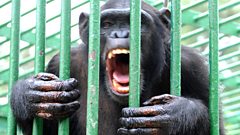Violence
How much is violence a choice, and how much a natural human instinct? Can breakthroughs in neuroscience and genetics transform the way we treat violent criminals?
A grim subject but intensely important: our human capacity for violence. What is it in our biology and our society that drives it? And is it something we can rise above? Criminal psychologist Adrian Raine argues that breakthroughs in neuroscience and genetics should be transforming the way we treat violent criminals. Human rights advocate Kavita Ramdas, examines why violence against women in India and beyond is not decreasing, despite advances in women’s rights. And primate anthropologist John Mitani explains what can be learnt from chimpanzees’ lethal aggression. Presented by Bridget Kendall.
(Photo: A man aiming to take a punch. ����ý copyright)
Last on
More episodes
Previous
Clip
Chapters
-
Kavita Ramdas
Duration: 15:17
John Mitani
Duration: 07:43
60 second Idea to Change the World: Three-lane sidewalks
Duration: 04:46
Adrian Raine
Duration: 12:54
Kavita Ramdas
![Kavita Ramdas]()
Kavita Ramdas is the Ford Foundation representative to New Delhi. She is the former president and CEO of the Global Fund for Women, the largest foundation in the world supporting women's human rights.��Her current work focuses on issues of equity, inclusion, economic fairness, freedom of expression, human rights, sexuality and reproductive health and rights, transparency and accountable governance, and sustainable development.
John Mitani
![John Mitani]()
John Mitani is a primate behavioral ecologist and professor in the Department of Anthropology, University of Michigan. His current research involves studies of an extremely large community of wild chimpanzees at , Kibale National Park, Uganda. Research to date has provided novel findings relating��to the effect of kinship on social behavior, co-operation, hunting, and territoriality. In particular, John and his colleagues have observed that lethal intergroup aggression leads to territorial expansion. In short, chimps kill for land.
Adrian Raine
![Adrian Raine]()
Adrian Raine is professor in the Departments of Criminology, Psychiatry, and Psychology, University of Pennsylvania. He is currently visiting professor at the Institute of Criminology, Cambridge University. In his latest book The Anatomy of Violence, Adrian argues that modern neuroscience is now providing evidence that violent criminals can be born as well as made. Genes and ‘broken’ brains show biology is an important (if previously dismissed) factor of violent behaviour. He believes that society needs to deal with the legal and ethical dilemmas implicit in this discovery, and consider more fully some controversial measures towards crime prevention.
��
60 second Idea to Change the World: Three-lane sidewalks
Criminal psychologist Adrian Raine proposes a solution for getting stuck behind dawdling pedestrians on busy streets – divide the pavement up into slow, middle and fast lanes! Slow lanes are for the elderly, child strollers, umbrella holders, the inebriated – and those dreadful cell phoners who crawl along and then stop dead right in front of you. The middle lane is for your average pedestrian - but if they hog that lane for more than 10 seconds, they get ticketed by 'Pedestrian Wardens'. The fast lane is for people in a hurry, but there’s no fine for speeding because people need to get a move on in life. And finally, its��three strikes and you're out! After three tickets you're banned for life from pavements and have to take a door-to-door taxi to get to wherever you want to go.In Next Week’s Programme
The Forum travels to Cambridge for the Royal Society of Chemistry’s international conference on Challenges in Renewable Energy.��We’ll be talking, among other things, about artificial photosynthesis and a new generation of biofuels from Brazil.��
Broadcasts
- Sat 7 Sep 2013 23:06GMT����ý World Service Online
- Sun 8 Sep 2013 10:06GMT����ý World Service Online
- Mon 9 Sep 2013 02:06GMT����ý World Service Online
What is the role of libraries in the digital age?
Podcast
-
![]()
The Forum
The programme that explains the present by exploring the past







